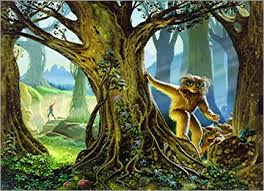
Pictured to the left is a Fuzzy. One could be forgiven for mistaking a Fuzzy for an Ewok. The two creatures bear a certain similarity, but it was the Fuzzies who first captured the hearts of readers, nearly fifty years ago. The Fuzzy series, consisting of Little Fuzzy, Fuzzy Sapiens, and Fuzzies: The Other People told the tale of cute alien teddy bears who were being exploited by various corporate and political interests on the planet Zarathustra and the effort of brave humans (read: whites) to save the Fuzzies from exploitation. What makes the series so delightful, but also so politically incorrect, is that the Fuzzies (read: Native Americans) are treated like huggable children who need to be protected by the big White Man in the Sky. Even the hero's Fuzzy name, Pappy Jack, implies his Father image among them.
The huggable Native American is actually a fairly common trope in science fiction. There were the Hoka of Poul Anderson and Gordon Dickson, the aliens of Battle for Terra, and the Ewoks of Return of the Jedi. What makes Native Americans and their alien offspring so delightfully huggable to white people? Do we have a secret yearning to be forgiven by our oppressed populations and taken back into the arms of the Native Mother? Or perhaps such portrayals are just the natural outgrowth of a century of colonial narratives, reaching from Star Trek's "The Apple" to Doctor Who's "The Power of Kroll" to Orson Scott Card's Speaker for the Dead and James Blish's Case of Conscience. What do you think?

This was the main reason I didn't see Avatar. From the reviews it was a White Man's Burden-a-thon
ReplyDelete